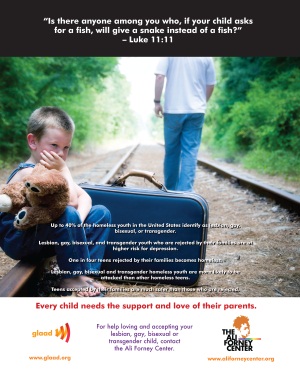The Gay & Lesbian Alliance Against Defamation (GLAAD) is praising Sojourners for passing its test. GLAAD sponsored an advertisement for the Ali Forney Center, a homeless shelter that aids lesbian, gay, bisexual, or transgender (LGBT) youth. The advertisement was, in part, a test of whether Sojourners would print an ad sponsored by a group like GLAAD.

In May, Sojournersdeclined to place an advertisement for Believe Out Loud, an organization that advocates for greater acceptance of LGBT individuals by churches. The video ad featured two women with a child entering a church where they were not welcomed by parishioners.
GLAAD’s director of religion, faith, and values Ross Murray approached Sojourners after the Believe Out Loud decision. GLAAD asked if the magazine would be opposed to advertisements by LGBT organizations who focus on one of Sojourners areas of focus and the organization agreed, according to Murray.
Sojourners president Jim Wallis said the magazine declined the Believe Out Loud ad because it did not address one of Sojourners core issues (e.g., poverty or homelessness). Expanding the scope of the social justice mission of the magazine to include LGBT rights was not feasible, Wallis said, because of a lack of consensus on the issue and limited resources.
“Instead, we have taken this opportunity to affirm our commitment to civil rights for gay and lesbian people, and to the call of churches to be loving and welcoming to all people, and promote good and healthy dialogue,” Walis said. “It is our hope that differing viewpoints are not silenced, but are lifted up in a display of Christian, and often interfaith, sisterhood and brotherhood. It is for this reason that we wish to engage first and we typically do not display advertising relating to issues amongst people of faith that have unfortunately, and too often, been reduced to political wedge issues.”
Brian McLaren, a former Sojourners board member, said he empathized with of those were frustrated with the Sojourners decision, but he agreed with it because expanding the magazine’s poverty-focused agenda to include LGBT issues. It would damage the coalition of progressive Christians Sojourners represents, he said.
“One can’t lead on other issues that would split the coalition,” McLaren said. “If Sojourners decides to lead on LGBTQ issues, someone else will have to arise to lead a broad coalition on poverty issues because Sojourners will be — as things stand — excluded from the table. Conversely, if Sojourners decides to lead a broad poverty-related coalition, others will need to lead on LGBTQ issues.”
GLAAD partnered with the Ali Forney Center to create an ad featuring a father leaving his young son sitting on a railroad track. The ad features statements about LGBT homeless youth on the high percentage of homeless youth who are LGBT and the greater risks of homelessness, depression, and insecurity faced by LGBT youth who are rejected by their families.
“[The ad] tests the notion of whether Sojourners would really accept an ad placed by an LGBT-focused organization,” Murray said. “It also demonstrates to the leadership and readership the overlap between the LGBT community and poverty, war/peace, and environment. It also continues the conversation about LGBT inclusion in the life of the church and the world.”
Sojourners communication director Tim King said that in addition to the ad, the magazine will be featuring blog posts on LGBT homeless youth and other issues raised in the ad. King said the ad highlights how LGBT youth are disproportionately affected by homelessness.
Prior to coming to Sojourners, King worked for years with homeless youth in Illinois. “I have talked with many teens who became homeless because they were kicked out of their homes or ran away from abuse by their parents because of their sexual identity,” King said. “After their homes became dangerous, they went to the streets, where many were attacked and some were trafficked or forced into prostitution.”
GLAAD’s Murray said his organization will continue to advocate that Sojourners address issues that affect LGBT people. “This is a first step on the journey, but by taking this step, GLAAD has found new potential allies and opened their eyes to the realities of LGBT people’s lives,” Murray said.
Sojourners‘ balancing act on gay and lesbian issues will likely continue. Its coalition includes some progressives who see gay rights as a social justice issue. It also includes those who hold to—theologically if not politically—conservative beliefs about marriage and sexuality. It includes pragmatists, like McLaren and others, who do not want to see a coalition of poverty-focused Christians cracked by the issue.








